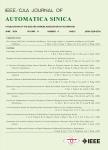Hybrid Dynamic Variables-Dependent Event-Triggered Fuzzy Model Predictive Control
作者机构:IEEE the School of AutomationChina University of Geosciencesthe Hubei Key Laboratory of Advanced Control and Intelligent Automation for Complex Systemsand the Engineering Research Center of Intelligent Technology for Geo-ExplorationMinistry of EducationWuhan 430074China
出 版 物:《IEEE/CAA Journal of Automatica Sinica》 (自动化学报(英文版))
年 卷 期:2024年第11卷第3期
页 面:723-733页
核心收录:
学科分类:0711[理学-系统科学] 07[理学] 08[工学] 081101[工学-控制理论与控制工程] 0811[工学-控制科学与工程] 071102[理学-系统分析与集成] 081103[工学-系统工程]
基 金:supported by the National Natural Science Foundation of China (62073303,61673356) Hubei Provincial Natural Science Foundation of China (2015CFA010) the 111 Project(B17040)
主 题:Dynamic event-triggered mechanism(DETM) hybrid dynamic variables model predictive control(MPC) robust positive invariant(RPI)set T-S fuzzy systems
摘 要:This article focuses on dynamic event-triggered mechanism(DETM)-based model predictive control(MPC) for T-S fuzzy systems.A hybrid dynamic variables-dependent DETM is carefully devised,which includes a multiplicative dynamic variable and an additive dynamic *** addressed DETM-based fuzzy MPC issue is described as a “min-max optimization problem(OP).To facilitate the co-design of the MPC controller and the weighting matrix of the DETM,an auxiliary OP is proposed based on a new Lyapunov function and a new robust positive invariant(RPI) set that contain the membership functions and the hybrid dynamic variables.A dynamic event-triggered fuzzy MPC algorithm is developed accordingly,whose recursive feasibility is analysed by employing the RPI *** the designed controller,the involved fuzzy system is ensured to be asymptotically *** examples show that the new DETM and DETM-based MPC algorithm have the advantages of reducing resource consumption while yielding the anticipated performance.



